voting rights

PEOPLE OFFER MANY reasons for not voting, from “one vote doesn’t matter” and “there’s no real difference between the parties” to the conviction that an election “won’t bring about real justice (or the reign of God).”
The latter, at least, is certainly true. Voting—even electing the best-available candidates for the most important positions in government—definitely won’t bring about the peaceable kingdom.
But who is ultimately elected—especially at the presidential level—can make a world of difference in the lives of those in the most vulnerable conditions. For instance, in the past three-plus years, more than 200 judges have been appointed to the bench, many of them to lifetime terms. Of that number, zero have been Black. And judicial appointment is only one of many powers in executive hands, which affect everything from education, housing, and immigration policies to whether our society makes the hard choices of confronting racialized policing and combating climate change.
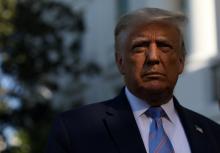
This morning President Trump posted the following unconscionable tweet regarding our upcoming election that dishonors Congressman Lewis’ legacy and poses a direct threat to our democracy:
With Universal Mail-In Voting (not Absentee Voting, which is good), 2020 will be the most INACCURATE & FRAUDULENT Election in history. It will be a great embarrassment to the USA. Delay the Election until people can properly, securely and safely vote???

Civil rights leader and long-time member of the U.S. House of Representatives John Lewis died on Friday at age 80 after a battle with pancreatic cancer.

These types of failures in the voting process may become additional tools in the arsenal of voter suppression, and the Black community must be prepared.
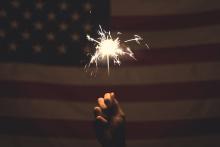
The Religious Right was not wrong to tell people of faith that the Bible is political. Its critical mistake and enduring sin is not that it challenged Christians to engage in public life, but that it invited us to join a reactionary coalition driven by racial fear, male chauvinism, and corporate greed. Decent people with sincere motives joined the Moral Majority and the Christian Coalition to put their faith into practice. But these organizations made fallible people worse than we would have been otherwise. They led us astray.
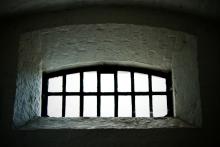
The continued demise of faith in this nation’s criminal justice system, elected officials, and government will increase wherever injustice is maintained in the name of “doing just enough”. If America is truly to be one nation, it must address and correct its patterns of injustice and persistent denials of full personhood for those who belong in this country and society.
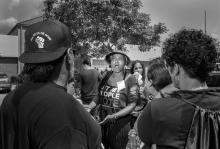
LAST FALL'S MIDTERM elections brought the country’s single biggest expansion of the right to vote since the 26th Amendment lowered the voting age to 18.
Florida voters passed Amendment 4, a change to the Florida Constitution that automatically restores voting rights to 1.4 million Americans who have been living and working in our communities but politically disenfranchised because of criminal convictions in their past.
Before this amendment, Florida’s policy was extra strict—one of permanent disenfranchisement for all felonies, meaning that it did not matter what you did, how long ago it was, or how old you were when you did it. If you had a felony conviction, you could not get your right to vote back unless the government decided to specifically grant you clemency. That meant that even people who had long ago completed probation and parole were still unable to vote.
This outcome in Florida is to be celebrated, for several reasons. Amendment 4 promotes full citizenship and permits more people to participate in the electoral proc-ess. It ends a blatant Jim Crow policy. It encourages successful reintegration into the community. But it also brings core Christian teachings into the public square—and it is important that we discuss these teachings because there is still work to be done.
Disenfranchisement of those convicted of felonies is still widespread, if not the norm. The clearest exceptions are Maine and Vermont, where persons never lose their voting rights, even while they are incarcerated. In two states—Iowa and Kentucky—any felony conviction results in permanent disenfranchisement unless the government specifically restores an individual’s rights, similar to the approach Florida just changed. Some states permanently disenfranchise certain citizens, depending on the felony conviction. A number of states—18, in fact—disenfranchise returning citizens until all terms of their sentences have been completed, which can end up being years after they have returned to the community.
What are we getting out of disenfranchising people the criminal justice system has determined are appropriate to be living and working alongside us? What does scripture advise?
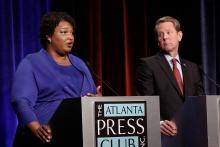
Souls to the Polls is a time-honored tradition, often led by clergy, to activate and engage congregants to exercise their right to vote that starts long before Election Day. It is a mobilization strategy to make the process of voting easier for their congregants. But sadly, voter suppression efforts targeting minorities in subtle and overt ways continue to make Souls to the Polls a critical service — placing the burden of voter education and empowerment on the backs of churches and other civil society organizations, not the government.
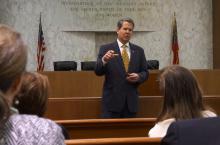
According to a report earlier this week from The Associated Press, more than 53,000 voter registration applications have been sitting on hold with Georgia Secretary of State Brian Kemp’s office. The people on the list are predominantly black, and may not even know their voter registration has been held up.
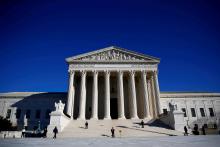
Voters purged from registration rolls who sued to challenge the policy in the Republican-governed state argued that the practice illegally erased thousands of voters from registration rolls and disproportionately impacted racial minorities and poor people who tend to back Democratic candidates.

CAL MORRIS WAS 20 and studying religion at Samford University in Birmingham, Ala., when he offered a stranger a ride. As they crested the Red Mountain Expressway, dropping into downtown, Morris, who’s white, and his passenger, a black man old enough to be his grandfather, talked about how bad public transportation in the city was, how hard it was to get to work without your own ride.
The next morning, in his religion classes, Morris announced he was raising money to buy his new acquaintance a car. “I was thinking: ‘I go to Samford. ... It’s one of the richest places ever,’” Morris recently remembered. “I figured I could get the guy an $800 El Camino.” Instead, his professors and peers offered calls for prayer. It was his friends at work, not his classmates, who knew what it was like to need a break, and so they pooled enough money for the car.
That was two decades ago. The “El Camino incident” set off a series of revelations for the kid raised middle class in north Alabama by evangelical parents who never really talked politics at home or at church. Morris began to see how racial and economic disparity were tied to public policy, and how his conservative Christian friends tended to ignore or fetishize vulnerable folks as nothing but needy.
He isolated himself from the evangelical community. He moved into his car in the woods with his dog. He abandoned the notion of leading a church and kept working in coffee shops, like the one where he’d met the old man, searching for ways to build the kind of community he idolized in Wendell Berry novels, searching for ways to be of use without any white savior hang-ups.
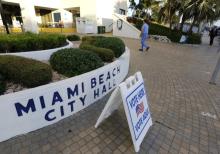
Florida's policy of banning felons from voting until they petition the government is unconstitutional and forces them to "kowtow" to the whim of state politicians, a federal judge ruled on Thursday. The ruling comes in a lawsuit filed on behalf of nine ex-felons denied the right to vote.
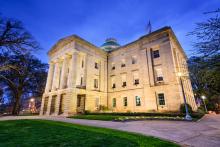
The U.S. Supreme Court has refused to hear an appeal by Republican leaders of a federal court ruling that removed ballot restrictions in North Carolina, due to the restrictions being discriminatory along the basis of race, reports Bloomberg News.

Republican South Carolina Gov. Nikki Haley will be a rare woman on Donald Trump’s Cabinet-level team, and one of the few persons of color.
Knowing little about her foreign policy positions, given that she has little to no international experience, what should we expect from Haley once she is confirmed to be ambassador to the United Nations?
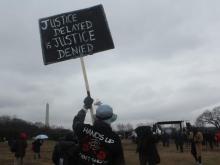
Crying out “no justice, no peace,” crowds joined the Rev. Al Sharpton in a weekend march towards the Martin Luther King Jr. Memorial, vowing not to let President-elect Donald Trump turn back strides made by the civil rights leader.
The mostly African-American throng — smaller than the thousands expected, due to the steady rain — heard from civic and religious leaders about key areas of concern: health care, voting rights, economic equality, and police brutality and reform.
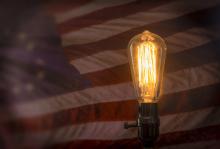
Now, more than ever, we need political candidates and elected officials on both sides of the aisle who value the rich and diverse tapestry of this nation and seek to build bridges instead of walls. And while we deserve candidates who exhibit civility and respect in their campaigns and governance, this has never been a guaranteed right. We must be committed and courageous enough to speak out for mutual respect and decency. We must challenge all leaders and hold them accountable to the values presented throughout the gospel.
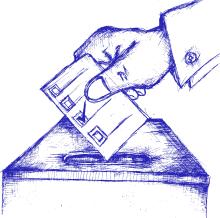
As a pastor in a historically black church, Quinn Chapel A.M.E. Church in Jefferson City, and the Executive Director of Missouri Faith Voices, a PICO federation, I say this attempt to silence and disenfranchise voters is contrary to the gospel of Jesus Christ. When I interpret Matthew 25, it is not merely about providing food, clothes, and hospitality — it is about transforming systems that have caused people to be left out.

Just this summer, a federal court struck down the North Carolina law, ruling that certain provisions of it “target African Americans with almost surgical precision.” The court added, “With race data in hand, the legislature amended the bill to exclude many of the alternative photo IDs used by African Americans” and “retained only the kinds of IDs that white North Carolinians were more likely to possess.” Yet, importantly, restrictive voter ID laws in a number of other states remain on the books, and will be in place for Election Day.

As the presidential election tightens and polls show Trump and Clinton within a few points of each other in North Carolina, Republican Gov. Pat McCrory has appealed the Supreme Court to reinstate previous voter ID laws and cuts to early voting, according to NBC News. This comes in the wake of numerous voter-ID laws throughout the country being struck down in the courts this past month.

Donald Trump is clearly appealing to our worst instincts, as many have said, but let’s be more clear: Donald Trump is appealing to the worst instincts of white people, and American history has shown how ugly and violent those white instincts can be. He is right when he claims to be bringing out people that have never voted before — but he leaves out that those new voters are angry white people.